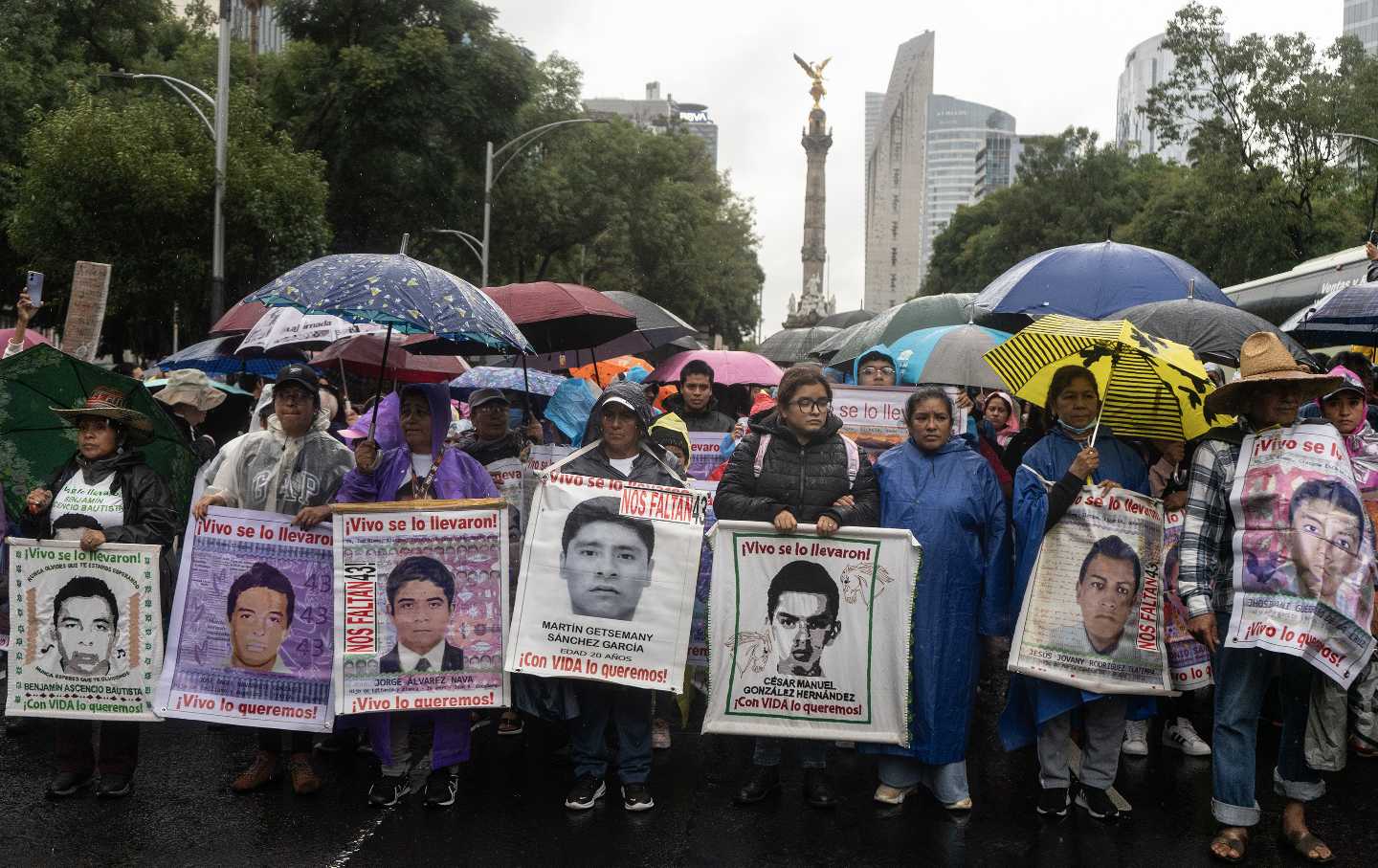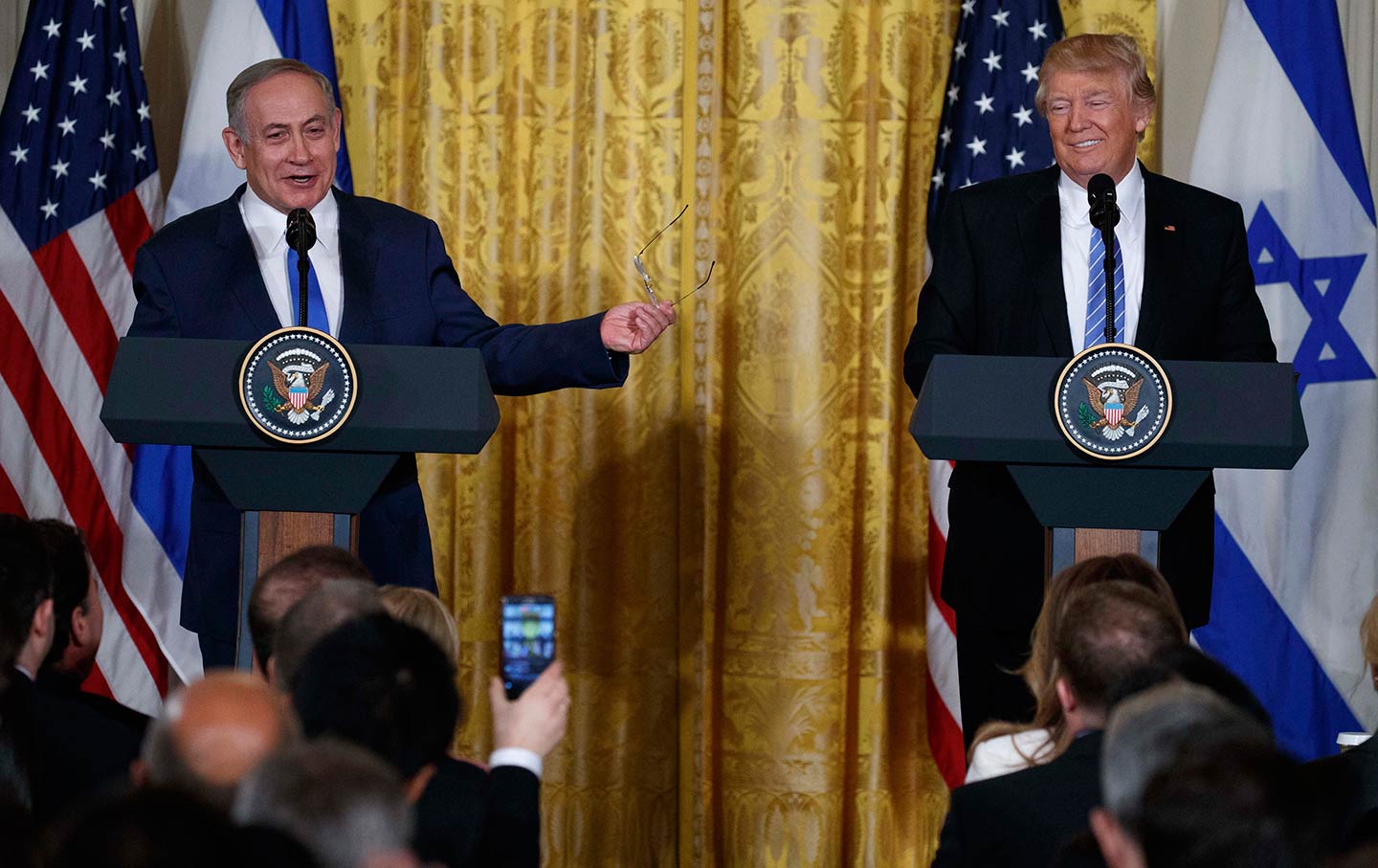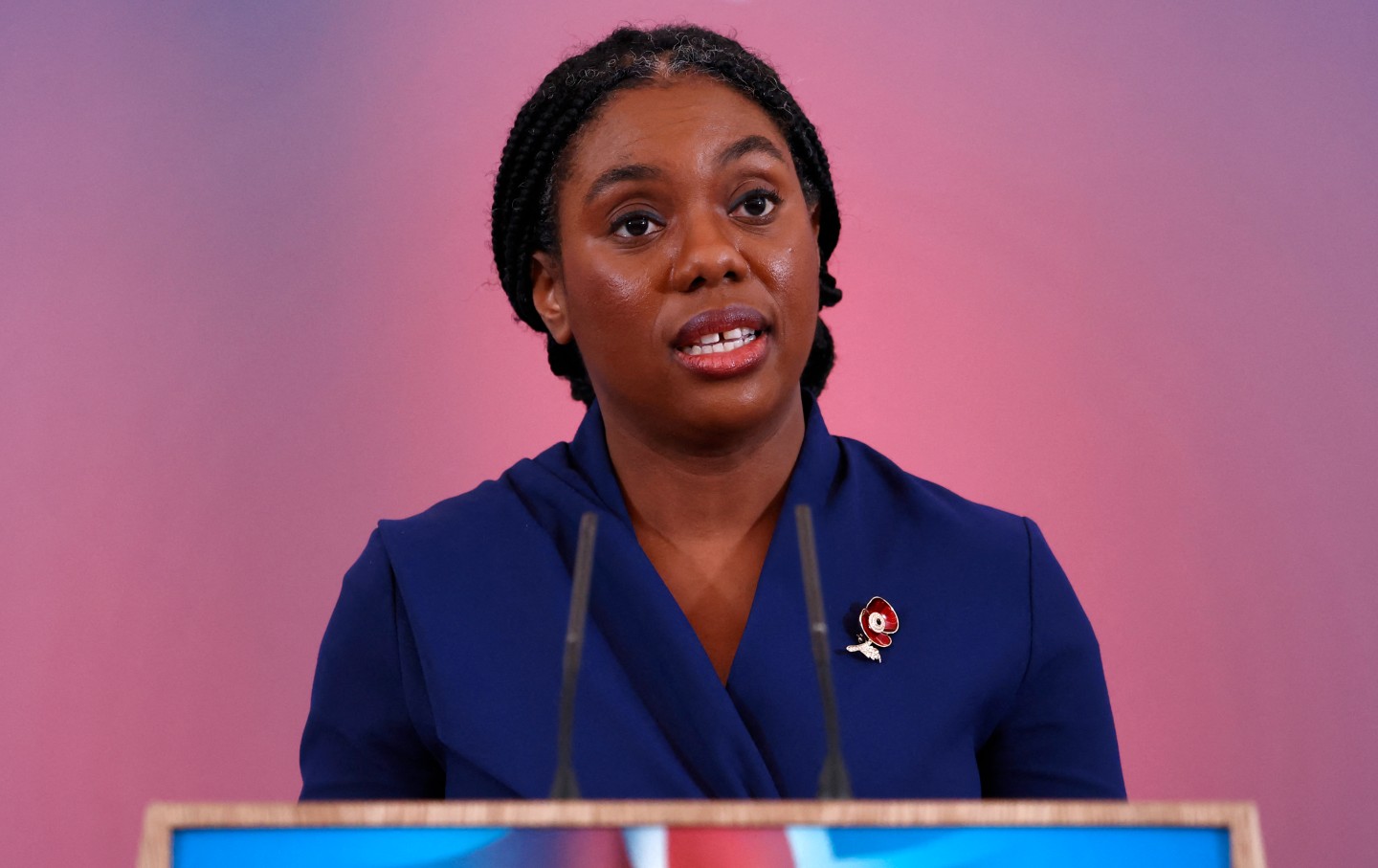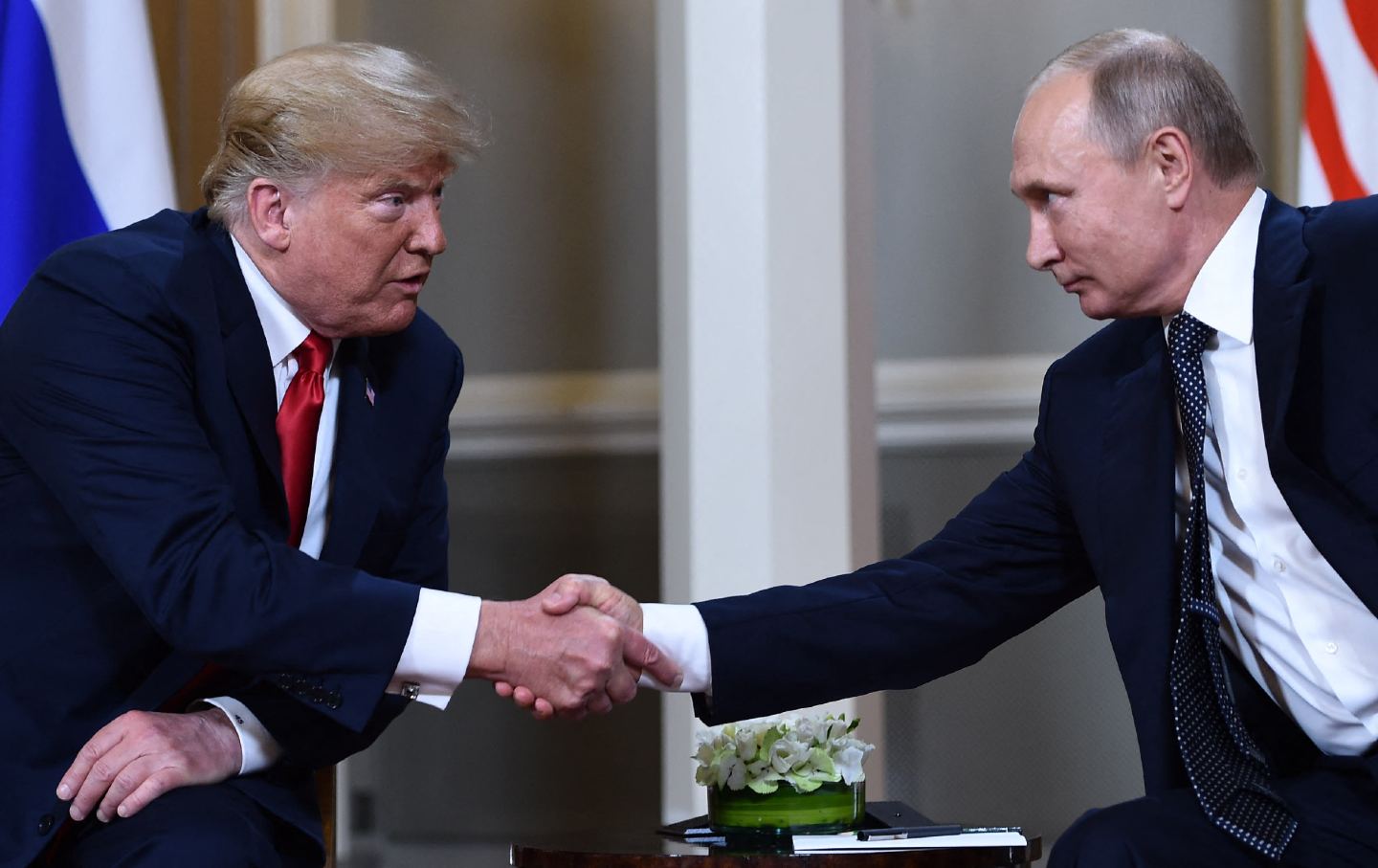AMLO Has Broken His Promise to Families of the Disappeared
On the 10th anniversary of the forced disappearance of 43 students in Iguala, victims’ families say the outgoing Mexican president has betrayed them.

Parents of missing students protest on September 26, 2024, in Mexico City.
(Cristopher Rogel / Getty)
Mexico City—In the early evening of September 26, in the final installment of a seven-day series of protests under the heading “10 Years of Impunity,” the families of the 43 forcibly disappeared students of the Ayotzinapa Rural Teachers’ College testified before a crowd in front of the National Palace. The rain from Hurricane John, which was battering their homes in the southeastern state of Guerrero, had reached the national capital, falling cold and heavy on people who chanted, “It was the army!” and “It was the state!”
The families of the young men had marched through the city to the Palace, the president’s official residence, accompanied by thousands of supporters, many of whom are also missing family members. Heavy metal barricades ringed the grand building, keeping the protesters at a distance from its façade. That morning, outgoing President Andrés Manuel López Obrador (AMLO), once a trusted ally of the Ayotzinapa parents, had said the barricades were necessary to protect against damage to the Palace by bad actors.
The facts of the Ayotzinapa case to date are that on the night of September 26, 2014, and into the next morning, municipal, state, and federal police officers, along with soldiers from the Mexican Army and members of the Guerreros Unidos organized criminal network, attacked six buses in the city of Iguala. Five of the buses had been temporarily commandeered by students of the all-male teachers’ college for their journey to Mexico City to commemorate the October 2 anniversary of the 1968 Tlatelolco massacre. The rationale behind the Iguala attack is disputed, but independent investigators allege that the police may have been attempting to protect a haul of heroin stashed on one of the commandeered buses and bound for sale in the United States.
The remains of only three students have been identified, and the fate of the other 43 is still unknown. The Mexican Army, which documented the attack in real time, has information about where they are. The Secretariat of National Defense (SEDENA), which oversees the army, refuses to hand over 800 folios of information that the international group of expert jurors appointed by the Inter-American Commission on Human Rights has requested. AMLO’s government, as well as that of his predecessor Enrique Peña Nieto, have both protected SEDENA against having to do so. No convictions have been made.
“Obrador betrayed the trust that we as parents placed in him and turned his back on the Ayotzinapa case by protecting the Army,” said Hilda Legideño, mother of Jorge Antonio Tizapa Legideño, when she took the microphone in front of the crowd in Mexico City.
“He will go down as an accomplice of those people who disappeared our children.”
In 2014, as news of the case broke around the country, Ayotzinapa quickly became an emblem of both the crisis of forced disappearances in Mexico and the collective struggle against them. The parents of the 43 rallied those who have suffered the disappearance of a child or relative and catalyzed the formation of the first National Search Brigades of family members who seek remains of the disappeared in clandestine gravesites. The Ayotzinapa school is one of Mexico’s socialist escuelas normales rurales, community-based, politically cohesive systems of education and formation whose solidarity and organization is reflected in the coordinated searches for the disappeared.
Taking the microphone after Legideño, Mario González, father of César Manuel González Hernández, addressed AMLO directly, calling him a “vulture,” saying, “You put yourself at the feet of the army that you’re so proud of…. You turned your back on all of us fathers and mothers whose children were disappeared by the state.”
The visceral denunciations by many parents of the disappeared students make their position clear: They have been played by AMLO, who had made their case the “central human rights commitment of his government,” as former special prosecutor Omar Gómez Trejo wrote last week in El Faro. They trusted that the president and his officials would deliver to them the truth of what happened to their children and seek restitution for their violent kidnapping. Despite the government’s constant backsliding and attempts from multiple actors to divide their united front, the parents continued to work with the government. Up until August of this year, they attended meetings with officials in Mexico City and posed for photo ops with AMLO as the perpetrators were arrested and released from prison, or, in the case of former security chief Tomas Zerón, fled to Israel to evade arrest.
“Expectations were raised that in this government justice could be obtained, that it would be possible to know what happened,” lawyer and spokesperson for the families Vidulfo Rosales told local media in the lead-up to the anniversary. After “a lot of optimism” among the parents, as AMLO’s term ends they have been left with “disappointment and despair.”
On September 24, two days before the anniversary, a contingent of the Ayotzinapa parents protested outside the gates of the national Senate chamber as its members deliberated on a constitutional reform to consolidate the National Guard, a civil force, into the armed forces. It was one of AMLO’s many betrayals. The former president swept to office on promises to send the army, deployed against its own people in the “war on drugs” declared by President Felipe Calderón in 2006, “back to its barracks” under an overall pledge to bring peace to a country torn apart by paramilitary violence. Yet AMLO ushered in an exhaustive militarization of public security and civic functions during his tenure. The Senate approved the reform to place the over 100,000–strong National Guard under the command of the military.
“The movement of the mothers and fathers of the families of the 43 raises its voice here in the Senate to say that it is dangerous for the country to empower an institution that operates in opacity, an institution that violates human rights as in the case of the 43 of Ayotzinapa, and that is not accountable to anyone,” said Rosales at the protest.
The cruelty meted out to the Ayotzinapa families by the AMLO administration—the giving and the taking away of official hope—typified its approach to the demands of social movements, civil society, and independent media for democratic principles such as transparency, accountability, and reparation. Morena—the populist party AMLO founded—uses the well-worn apparatus of the Mexican state and the former one-party system to grant impunity, co-opt grassroots activism and advance policies like militarization, repression of migration, and removal of institutional checks and balances. As the Ayotzinapa parents have testified, once the investigation into the disappearance of their children got too close to SEDENA (the masters of the state apparatus), they, along with the social movement they activated for the disappeared all over the country, were discarded. Under AMLO, the number of people registered as disappeared in Mexico since 1964, when the country was in the throes of the Dirty War, reached at least 116,000; over 50,000 were recorded during the six years of his presidential term.
“We have walked with the hope of finding our children,” said Legideño before the National Palace on September 26.
Popular
“swipe left below to view more authors”Swipe →“We have received solidarity from you and for us,” she continued, addressing the crowd.
“You have sheltered us and have walked with us as parents. Sometimes we do not know what to say or what to do. We would like to leave, but we cannot because we are missing a son at home.”
As the AMLO administration retreated further and further from its commitments to resolve the case, the emblem of Ayotzinapa as an electoral device for Morena was emptied of its hope for justice for the disappeared, becoming instead a testament to the state’s abject refusal to meet even the most morally urgent demands of its people. There is little evidence that AMLO’s successor, Claudia Sheinbaum, plans to do anything differently. As a people’s struggle, however, Ayotzinapa will endure hasta encontrarles, as the movement slogan goes: until the disappeared are found.
We cannot back down
We now confront a second Trump presidency.
There’s not a moment to lose. We must harness our fears, our grief, and yes, our anger, to resist the dangerous policies Donald Trump will unleash on our country. We rededicate ourselves to our role as journalists and writers of principle and conscience.
Today, we also steel ourselves for the fight ahead. It will demand a fearless spirit, an informed mind, wise analysis, and humane resistance. We face the enactment of Project 2025, a far-right supreme court, political authoritarianism, increasing inequality and record homelessness, a looming climate crisis, and conflicts abroad. The Nation will expose and propose, nurture investigative reporting, and stand together as a community to keep hope and possibility alive. The Nation’s work will continue—as it has in good and not-so-good times—to develop alternative ideas and visions, to deepen our mission of truth-telling and deep reporting, and to further solidarity in a nation divided.
Armed with a remarkable 160 years of bold, independent journalism, our mandate today remains the same as when abolitionists first founded The Nation—to uphold the principles of democracy and freedom, serve as a beacon through the darkest days of resistance, and to envision and struggle for a brighter future.
The day is dark, the forces arrayed are tenacious, but as the late Nation editorial board member Toni Morrison wrote “No! This is precisely the time when artists go to work. There is no time for despair, no place for self-pity, no need for silence, no room for fear. We speak, we write, we do language. That is how civilizations heal.”
I urge you to stand with The Nation and donate today.
Onwards,
Katrina vanden Heuvel
Editorial Director and Publisher, The Nation
More from The Nation

Warning From the Past Warning From the Past
In a new film, journalists confront a dictator.

The Case Against Joe Biden for Complicity in Genocide The Case Against Joe Biden for Complicity in Genocide
The ICC has applied for an arrest warrant for Benjamin Netanyahu. But Israel’s assault on Gaza has been made possible by US support.

Gazans Heard Trump's Promises. Now They Want Him to Keep Them. Gazans Heard Trump's Promises. Now They Want Him to Keep Them.
Trump made a direct pitch to end the war on Gaza. The people still living there were listening.

The Fallout of Biden’s Middle East Policy Is Now Trump’s Responsibility The Fallout of Biden’s Middle East Policy Is Now Trump’s Responsibility
In Trump’s hands, the country's diplomatic strategy in the Middle East can only get worse.

The New Face of British Conservatism is Black—and Female The New Face of British Conservatism is Black—and Female
The London-born daughter of Nigerian parents presides over the ruins of 14 years of Tory rule. Can her brand of nativism-lite bring the party out of the wilderness?



